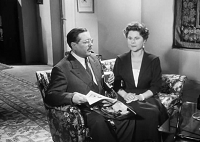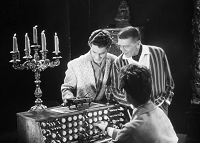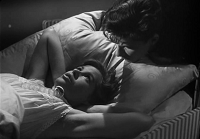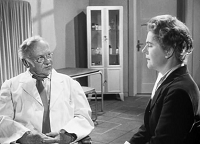The Third Sex
02/13/2017
West Germany / 1957 / German
Directed by Veit Harlan
With Christian Wolff, Paula Wessely, Friedrich Joloff
 Camp and homophobia aren’t often considered entwined, but they also aren’t mutually exclusive; both are epithets retroactively applied to post-war cinema with liberal gusto. Take Veit Harlan’s The Third Sex, middle-class and of middling quality (even by the director’s standards), as an example of one such confused twisting of social sensibilities. While it looks quite pallid and stodgy, it’s a deceptively good core sample of the almost unjustly prosperous 1950s.
Camp and homophobia aren’t often considered entwined, but they also aren’t mutually exclusive; both are epithets retroactively applied to post-war cinema with liberal gusto. Take Veit Harlan’s The Third Sex, middle-class and of middling quality (even by the director’s standards), as an example of one such confused twisting of social sensibilities. While it looks quite pallid and stodgy, it’s a deceptively good core sample of the almost unjustly prosperous 1950s.
High school student Klaus Teichmann’s parents are worried about him. They needn’t be; he’s the top in his class, seems happy and enthusiastic, and is an aspiring painter. The trouble is, he spends so much of his time with his friend Manfred, a sickly and effeminate boy who writes poetry. Klaus’ father Werner, a bank manager, wants his son to get with reality, and consider a future and a career. His mother Christa, a housewife, is more understanding, seeing her son’s artistic gift as a good sign for the future. What they can both agonize about together is his lack of conventional maleness. Off the shelf comes a medical book that, in German gothic script, defines homosexuals as “the third sex”.
This sends them into a tizzy. They consult a psychiatrist, who recommends loosening the reins, being less repressive. The wheels begin to turn in Christa’s mind – she starts thinking about taking an active role. Werner’s response to the problem is the opposite. He locks Klaus in the bedroom, so the boy just sneaks out the window. The live-in maid, a young woman named Gerda, is generally quite supportive of Klaus, and provides him with alibis when he has been at Manfred’s house.
Meanwhile Klaus has begun accompanying Manfred to the house of Dr. Boris Winkler, an older antiques dealer who surrounds himself with young men. At his house – a secretive den of Vincent Price-quality decadence – they listen to electronic music (“musique concrète,” he calls it), quote Virgil and watch wrestling matches in the middle of the living room. When Werner and Klaus’ uncle Max show up looking for the boy, the dutiful butler turns them away. Klaus becomes enamored of Winkler, while keeping a safe physical distance. The man’s sophisticated words and manner have a hypnotic hold on him, like they have for many young men. Manfred exudes a malicious cattiness, and does a lot of hiding behind trees. He already has his hands full keeping Klaus away from the heteronormative world, but also must avoid losing him to Winkler entirely.
While the bumbling Werner takes the unsubtle tack of going after the bad influences in Klaus’ life, first by forbidding him to see Manfred, and later by going straight to Winkler with legal threats. Paragraph 175 was still around, making homosexuality illegal. Meanwhile Christa is at work behind the scenes. She sees Gerda as someone who could bend Klaus toward more normal boy behavior, and suggests to the girl that there could be some sort of monetary reward for doing so. Things spiral from there, and result in the film’s opening shot, where all the characters are standing sheepishly before a judge in a courtroom.
 The film fails, in spectacular and interesting ways, to settle on a message or a position. A little context is needed. Harlan hoped to revive his reputation by taking on a project that would contribute to the social discourse. It seems that even the film’s inception and creation were defined by battling sensibilities: those found in Felix Lützkendorf’s script, which had meant to vilify homosexuals, those of Harlan, who wanted to soften the message, and those of activist Hans Giese, who got involved with the production in hopes of influencing public opinion toward abolishing Paragraph 175.
The film fails, in spectacular and interesting ways, to settle on a message or a position. A little context is needed. Harlan hoped to revive his reputation by taking on a project that would contribute to the social discourse. It seems that even the film’s inception and creation were defined by battling sensibilities: those found in Felix Lützkendorf’s script, which had meant to vilify homosexuals, those of Harlan, who wanted to soften the message, and those of activist Hans Giese, who got involved with the production in hopes of influencing public opinion toward abolishing Paragraph 175.
Not only that, but after it was finished, the censors wouldn’t release it unless scenes were added, extracted, and redubbed in order to make it more homophobic. So an already-confused film got heavily altered for the final product. But it’s the confusion that makes it compelling. It’s not as much about homosexuals in society – as caked in misunderstood exotica as The Third Sex is – but intergenerational conflict. The sanitizing of its content perhaps left this central issue alone, but neutralized the very dissonance that gives it weight.
Harlan’s 1940 film Jew Süss is remembered as a humdrum period piece as much as vitriolic artifact of antisemitic propaganda. The takeaway from the documentary about Harlan (it’s less an investigation of his life than a series of reactions from his grandchildren) is not that he was a monster – and not a spectacular valorizer of Nazism like Leni Riefenstahl – but an opportunist whose failure was not being critical of the blatant, horrible stereotyping that his films (particularly Jew Süss) did. In fact, that film was a twisted revision of a book that apparently had a more humane message to it. And, at the time of its release, Germany was already saturated with such stereotypes. Harlan didn’t – and couldn’t – do anything to run counter to them.
The political climate in which Harlan rose to prominence also didn’t tolerate homosexuals. They were categorized as social undesirables, and rounded up and killed by the thousands. In many different regimes, not just the genocidal ones, it’s a convenient excuse for a witch-hunt. Under national socialism, if someone wasn’t a communist or a Jew, they could easily be denounced as homosexual and could do little to prove otherwise. The relative tolerance of the previous decades had given way to a purge.
While it would be a stretch to call it very introspective, The Third Sex is (of course) more nuanced than American films of its time. Despite the populist fudging of the variation among people and their feelings, there’s an impulse in it to understand, and not just attack. (But attack it does – and more the closeted impulses of its makers than the sexual minorities it portrays). The characters may be hollow, inhabiting a crispy world somewhere between Tod Haynes’ Superstar (1987) and Andy Hardy, but by the end of it, a number of sensitive, albeit flat, portraits have floated to the surface. There is the creative, sickly Manfred, too fragile and poetic for the brawling boys’ school that he and Klaus attend; there is Gerda, a D.D.R. refugee working as a maid, eager to please everyone, whose economic situation gets exploited by the family she works for.
And, most strikingly, the character of Dr. Winkler is more complex than the afterschool-special predator that he initially slinks into the film as. With his fixations on Greco-Roman combat and cutting-edge electronic sound, he surrounds himself with the outlandish, past and present, that ordinary folk just don’t get. His sybaritic gatherings (anticipating the “happenings” of the 1960s) are supposedly corrupting youth who would otherwise be on a normal path. It’s like the ‘beatnik’ hysteria mixed with the classic Teutonic fear of the influence of the mysterious Greeks. Meanwhile Stockhausen’s pure electronics are rendered ridiculous, with a young man paid by Klaus to twiddle the knobs of the trautonium haphazardly (which more or less becomes Manfred’s theme music).
 In trying to set up a cautionary character through fearful assumptions, the film inadvertently stumbles upon an important inspirational figure in less enlightened times: the educator of gay youth, a mentor whose presence makes outsiders like Klaus and Manfred feel less alienated. Yes, Winkler is an exaggerated villain, gathering young men around him so that he can sexually exploit them. But people like him, who were pioneers in repressive societies by creating safe spaces for gays, also freed self-expression. While the film is meant to suggest that the young men are naively forfeiting their future prospects to run with a charismatic monster, seen nowadays it looks more like he is helping them to discover themselves.
In trying to set up a cautionary character through fearful assumptions, the film inadvertently stumbles upon an important inspirational figure in less enlightened times: the educator of gay youth, a mentor whose presence makes outsiders like Klaus and Manfred feel less alienated. Yes, Winkler is an exaggerated villain, gathering young men around him so that he can sexually exploit them. But people like him, who were pioneers in repressive societies by creating safe spaces for gays, also freed self-expression. While the film is meant to suggest that the young men are naively forfeiting their future prospects to run with a charismatic monster, seen nowadays it looks more like he is helping them to discover themselves.
It’s quite common to think that America in particular became more normative immediately following the war. Is it because there was nothing to compel in the other direction, to advance enlightenment and tolerance? If so, then perhaps defeated societies, the ones, like Germany, that were traumatized and reconfigured, were more inclined to examine themselves. Perhaps Germans were pushed to ask important questions, beyond the matter of which dishwasher matches the wallpaper in the kitchen.
Harlan’s film is, at its core, homophobic, and in the same know-it-all, draconian and clinical way that mainstream 1950s America was. But its message is only as pure as the characters and mise-en-scène that deliver it, all of which are rather muddled. The very fact that it doesn’t know what to vilify makes it compelling and unsettling and, in a way, more engaging than Douglas Sirk’s saran-wrapped living-room dramas of the same period.
Horror at a world – imagined in the clubs that Winkler and his friends frequent – where you can’t visually discern a person’s sex is notably dulled, and you can tell that Harlan wants to yawn at it. Rock ‘n roll is not much of a threat, as it was in America where racial implications were at stake. The philistine references to Greece – someone mentions the “platonic pederasty” latent in poetry – are (probably) meant to be laughable. The film also bypasses the right-wing eroticism, more formed of power struggles than sensuality, that Luc Moullet points to in the films of DeMille and Sternberg. This is because it looks more critically and openly at power and sexuality than Americans found permissible. Gerda’s nude scene, incidentally, was cut for that market (while the homoeroticism was left intact).
Harlan’s film is unable to even treat bourgeois suburbia with vapid ease. Nearly every facile pronouncement is countered by a jaded response (usually between Christa and Werner). All the characters seem too run-down to be clever, even the youth. The best of these understated performances is Paula Wessely’s, as Christa, who barely moves her lips while holding a cigarette in that thumb-and-forefinger way that only Germans and Ayn Rand did. In the crisis of their son’s sexuality, her husband says to her, “you women radiate an uncertainty that’s ridiculous.” She replies, “you radiate certainty that’s scary.”
 What the film does competently is stuffy sitting rooms and pale light – white-bread trappings, with swords and shields on the walls. There is also some spectacular hybrid space, like the study that appears to segue seamlessly into a greenhouse and a backyard. The Teichmanns’ sprawling, suburban home contrasts with the small, bare apartment that Manfred shares with his mother, a seamstress. If Harlan had made more like this (not in theme but in ambiance), and if it weren’t taboo to celebrate his work, it’s possible that the Fassbinder/Wenders/Schroeter generation would have exhumed his late films over (or at least in addition to) those of Sirk.
What the film does competently is stuffy sitting rooms and pale light – white-bread trappings, with swords and shields on the walls. There is also some spectacular hybrid space, like the study that appears to segue seamlessly into a greenhouse and a backyard. The Teichmanns’ sprawling, suburban home contrasts with the small, bare apartment that Manfred shares with his mother, a seamstress. If Harlan had made more like this (not in theme but in ambiance), and if it weren’t taboo to celebrate his work, it’s possible that the Fassbinder/Wenders/Schroeter generation would have exhumed his late films over (or at least in addition to) those of Sirk.
Sirk’s American films (the latter ones – which aren’t too numerous, forming a sub-genre of the director’s work) allege to be describing suburbanites’ smothered passions. But the emotions and connections are strangely reported rather than recreated. There is the air of death around them, like a plattered fish that’s been dressed up with colorful vegetables so as to appear lively. Harlan, while known by the end of his life as a master of kitsch, can’t deliver a setting as neatly asphyxiated. The Third Sex, overdone and oily, combines jockish ineptitude with sexual elasticity in strange ways. The world isn’t sealed like Sirk’s, and archaism seems to lurk just behind the next pert shrub or wan apple tree. And, above all, it takes its squareness too far, so its peaks, edges, and even its margins are actually quite sharp. Sharp as Winkler’s crew-cut.
The things that Klaus and Manfred engage in – poetry, modern art, listening to strange lathe-cuts by Boris – are meant to be degenerate and antithetical to straight society. But then, look at the exemplars of straight society that the film provides: the police are heavy-breathing bruisers; Klaus’ father and uncle are curt, rough and boorish; Manfred’s destitute mother essentially sells the boy to Winkler to help the family out with money. Not a decent human among them. It becomes difficult even to apply a modern interpretation of the film because it is, from its beginnings, confused in its judgments, and so the content is scrambled. The re-cuts that it went through don’t make matters clearer. Apparently the government censors objected to the sympathetic treatment “decadent weaklings” like Manfred and Winkler received. So it was modified and re-titled to the less provocative Different From You and Me.
The Third Sex is not as humanizing to its gay and curious characters as Basil Dearden’s Victim (1960) but not as flat and smug as an American “issue-based” film would be. 1950s America didn’t treat the issue of gays like something worth discussing, in hopes that they would simply go away. Like Victim, in which a homosexual lawyer is hounded by blackmailers, the film gives the impression that what people do in private, as long as they are white European males, is their own business. In Victim the blackmailers are the criminals. The Third Sex isn’t so sure, and still keeps its distance from gay people, at times overdoing the distancing act.
The film was too blundering to help the cause of homosexuals at all (Paragraph 175 remained on the books until 1994), and was not homophobic enough for the censors. To this day it’s impossible to see the original cut of the film, so it’s hard to eye it with precision. But we can find vestiges of Harlan’s intention to create something more humanist. When Winkler goes to see a gay lawyer about his legal rights, the man lectures him on morality and monogamy. In another scene, when his international friends are hanging out at his house, it half gives the impression of an influential cabal and half of an attempt to show gays as cultured and well-adjusted. Both of the above scenes were cut for the straight-laced West German censors.
 At first it seems to be stoking fear of the younger generation not being like their parents. But then, as if midway through digesting this idea, it seems to pick up on the more popular sentiment that it is, in fact, a good thing that the youth aren’t like the previous generation. This is something that Germans on both sides were forced to acknowledge, and indeed, to help actualize. In America it took big social movements, and tooth-and-nail culture wars to arrive at a comparable level of understanding. Even into the present, many Americans never caught on, living in a sheltered, conservative bunker of rightness and certitude, where it feels safe.
At first it seems to be stoking fear of the younger generation not being like their parents. But then, as if midway through digesting this idea, it seems to pick up on the more popular sentiment that it is, in fact, a good thing that the youth aren’t like the previous generation. This is something that Germans on both sides were forced to acknowledge, and indeed, to help actualize. In America it took big social movements, and tooth-and-nail culture wars to arrive at a comparable level of understanding. Even into the present, many Americans never caught on, living in a sheltered, conservative bunker of rightness and certitude, where it feels safe.
Harlan was known for fantastical high-camp, not social critique. The sureness of the Heimatfilms of what German culture meant, by this time in the late 50s, seems to have been laid waste, nothing for certain anymore. Gerda, who seems a wholesome character straight out of an Alpine-set musical, is recast as a seducer. Even the parents, guardians of the money-conscious family in a time of economic miracle, become monsters under the law. The film’s indecisiveness crushes the characters’ intentions, and so there are no good guys by the end – not the parents, (whose exploitation of their maid gets called out and problematized), not really Winkler (who slips through the fingers of the law and ultimately skips town), and certainly not the sweaty policemen, who first go after the only openly gay character, and then Christa.
The film is perhaps more fascinating for what it omits (and what was cut from it) than even the hodge-podge of salaryman exotica that it includes. In seeking a sort of progressive modernism, it attacks both “fruity” intellectualism and tactless misogyny. The teenagers in the film are all portrayed as being mired in either one or the other – young Klaus swerving between both with youthful abandon and lit-up, smiling cheeks over pursed lips. Any expected commentary on how the hearts and minds of the kids are being lost, from overly nurturing mothers or straitjacketed capitalist fathers, somehow doesn’t make it into the picture.
The mother’s using of Gerda is ultimately what brings the family down – a fascinating outcome in an oppressively gendered world. What seems, at first blush, like a conservative, conventional hysteria-film gradually materializes in a somewhat (but not radically) different place. Almost in spite of itself, it comes out ambivalent, tramping all over the issues it’s supposed to investigate, but also revealing the anxieties under the skin of a changed – and changing – society, the uneven healing of scar tissue.